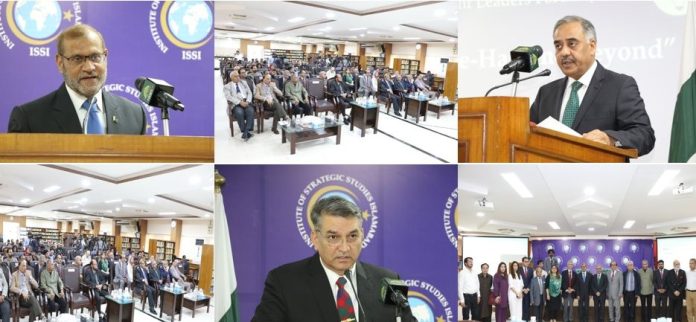ISLAMABAD, AUG 27 /DNA/ – In its latest edition of the Thought Leaders Forum (TLF), the Institute of Strategic Studies Islamabad (ISSI) hosted former Chief of Air Staff, Air Chief Marshal (R) Sohail Aman as the Distinguished Speaker. The session was titled “Marka-e-Haq and Beyond.”
DG ISSI Ambassador Sohail Mahmood, in his remarks on the occasion, described “Marka-e-Haq” as the latest manifestation of Pakistan’s resolute defence against Indian aggression, where the armed forces, with the united backing of the whole nation, thwarted India’s reprehensible designs and successfully defended the country’s sovereignty and territorial integrity. He noted that the crisis was triggered by the BJP regime driven by the toxic mix of Hindutva ideology, electoral calculations, presumptions of military and technological superiority, misguided war- fighting doctrines, quest for regional hegemony, and incalculable hubris and arrogance.
Ambassador Sohail Mahmood underlined that throughout the crisis period and actual conflict in May 2025, Pakistan prevailed across all key domains — diplomatic, military, and informational — with the Pakistan Air Force demonstrating its prowess in what has been termed the largest air battle in history, downing at least six Indian fighter jets. He added that Pakistan’s calibrated military response, ‘Operation Bunyan-um-Marsoos,’ represented a decisive shift towards integrated, multi-domain warfare by combining drone operations, precision strikes, cyber disruption, and joint command and control. Ambassador Sohail Mahmood cautioned, however, that the situation remains fragile as India insists that there is only a pause and that ‘Operation Sindoor’ continues in different forms. He also underscored the dangers of India’s belief in space for a limited conventional war under the nuclear threshold and stressed that for the sake of strategic stability India needs to be disabused of this false notion. Emphasizing the need for constant vigilance and high preparedness, he underlined the imperative of military modernization, indigenization, and proactive diplomacy to deter future aggression and advance the cause of sustainable peace in South Asia.
Air Chief Marshal (R) Sohail Aman, in his comprehensive talk, underlined that there remains a dangerous disconnect between the global quest for peace and India’s active pursuit of conflict with Pakistan. He also underlined that it was fundamentally wrong on the part of anyone to think that Pakistan would not respond in the face of the provocation and military aggression undertaken by India. He added that “Marka-e-Haq” and Operation Bunyan-um-Marsoos represented a fundamental transformation towards multi-domain warfare, where Pakistan innovatively employed air power alongside precision strikes and cyber disruption. He specifically stressed that India’s misperception — that Pakistan would not respond — was a reckless notion, firmly dispelled by Pakistan’s robust military and national response. He also challenged India’s false narrative of having confronted a joint China-Pakistan force, calling it a face-saving measure. He asserted that a technologically advanced and operationally superior Pakistan Air Force decisively outperformed its numerically larger Indian counterpart. While noting that nuclear deterrence held during the crisis, Air Chief Marshal Aman warned against India’s misguided belief that there is space for a limited conventional war under the nuclear threshold. He cautioned that although a nuclear exchange remains unlikely, uncontrolled escalation could not be ruled out. Therefore, it was essential to ensure that Pakistan’s clearly defined red-lines are not crossed. He concluded that the region’s future peace rests on dialogue and diplomacy and resolving disputes such as Kashmir. He also stressed prioritising economic development, stability, and trade and connectivity.
Earlier, in his introductory remarks, Director China-Pakistan Study Centre, Dr. Talat Shabbir, highlighted the timeliness of the discussion. He emphasised that during “Marka-e-Haq,” all elements of Pakistan’s national power, backed by strong political leadership and public support, successfully safeguarded the country’s sovereignty and restored balance in the region.
The address was followed by a thought-provoking question and answer session, where participants engaged deeply with the speaker on evolving regional dynamics, multi-domain warfare, and the future of deterrence stability in South Asia.
Ambassador Sohail Mahmood presented a memento to Air Chief Marshal (R) Sohail Aman.
The session brought together scholars, diplomats, and policy experts for an insightful discussion on strategic stability, evolving conflict dynamics, and pathways to enduring peace in South Asia and beyond.

















